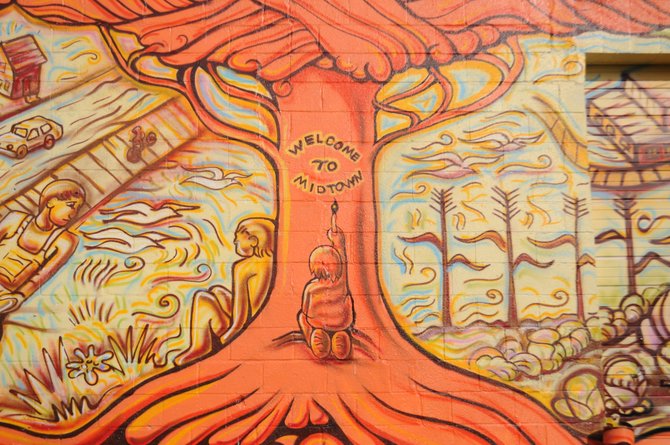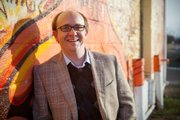Mural by Kelli Nichols Photo by Trip Burns.
Jackson has made positive strides over the last few years, and I believe our best years to be in front of it—but there is still a lot of work for all of us to do. Instead of running in a million different directions and hiring consultants to tell us what we should be able to figure out on our own, I believe a three-pronged approach can carry us further than any idea imbedded deep in the countless market, feasibility and impact studies that have been commissioned over the years.
FIRST, we need to build social capital. Robert Putnam, an academic authority on social capital, points out in his book, "Better Together: Restoring the American Community," that many in the most positive community development efforts did not set out to "build social capital." Whether the goal was trying to increase the farm incomes of families in Mississippi, build parks in Portland, Maine, or help poor kids in Philadelphia, the people in these stories discovered the most critical component to success hinged on the creation and exploitation of social networks and interpersonal relationships.
In Jackson, regardless of race, political affiliation, religion, social class, sexual orientation or whatever, we must begin to trust one another and create more meaningful social networks. There is a tremendous amount of value in creating positive human networks and shared trust. We must build more social capital.
SECOND, we need to not allow broken windows. In a 1982 Atlantic Monthly article, James Q. Wilson and Dr. George Kelling offered the "broken windows" metaphor in the context of crime prevention extending beyond simply arresting lawbreakers. The broken-windows theory quite simply demonstrates that at the community level, disorder and crime are usually inextricably linked and linked in a sequential manner. Put another way, if a window in a building is broken and left unrepaired, the remainder of the windows will soon be broken as well.
In Jackson, we must commit all necessary resources toward code enforcement to ensure that there are no broken windows. Untended property leads to untended behavior, and untended behavior leads to the breakdown of community controls. The breakdown of community controls leads to increases in property crime and violent crime.
FINALLY, and probably most import, we need to tell our own story. I am tired of the negative commentary and snide comments about Jackson, the overwhelming majority of which are made by people or organizations that derive some benefit from our city. Some people, fundamentally, do not understand that as Jackson goes, so goes Mississippi. Having said that, we, the residents of Jackson, have no one to blame but ourselves. We have let too many other people tell our story for far too long.
In Jackson, we need to focus on the positive attributes of the city and make sure that those stories are on the forefront of the discussion about our state's capital city. Good, bad, or indifferent, we need to own our story.
Our current citywide leadership encourages me. I believe we have a real opportunity to change the trajectory of our capital in a positive way for many years to come; but this effort will necessitate the engagement of all of us.
The McLaughlin Challenge
I challenge you to be the change for Jackson.
- Intentionally introduce yourself and your children to new experiences that involve diverse groups of people.
- Coordinate and facilitate, in a meaningful way, the sharing and dissemination of information and best practices among our neighborhoods and neighborhood organizations. Fully integrate the Jackson Police Department into this effort.
- Form and fund a Main Street coordinating program for the City of Jackson.
- Democratize municipal decision-making by providing an idea-sharing platform and allow for participatory budgeting in certain circumstances.
- Provide a mechanism where community improvement projects, such as the construction of parks, sidewalks, gardens, community centers and even the demolition of dilapidated structures, can be co-financed with the City of Jackson by neighborhoods and communities through a crowd-sourcing platform.
- Leverage public-sector and private-sector resources to create a seed stage accelerator program located in the City of Jackson that is focused on specific industries or subsets.
- Revamp the 311-service request to be user-friendlier and provide for reporting through a smartphone based application. Addressing the 311-service requests in a timely and efficient manner is critical, but the open-source data gathered through the reporting process is more valuable long term.
- Create an innovation loan fund using city resources to encourage innovation, accountability, and entrepreneurship related to the provision of city services. A funded project must meet only two requirements: The project must make the City of Jackson more efficient from a service provision perspective, and the project must pay for itself within two years.
- Even if this means reaching down in age, find people who are capable of continually creating new ideas and place them in positions of leadership within the public and private sector. We live in a knowledge economy and knowledge and the creation of new ideas have never been more valuable.
- Finally, whatever you decide to do, make sure that it is measurable and that you are accountable to someone.
WANTED: Social Capital
In his books and on bettertogether.org, Harvard public-policy professor Robert Putnam warns about shrinking "social capital," which he defines as "social networks and the norms of reciprocity and trustworthiness that arise from them." Activities as simple as dinner parties and going bowling are key to the restoration of community, he argues: " Once-commonplace activities such as the dinner parties and community arts performances described above are slowly vanishing from the American landscape. Increasingly, Americans are withdrawing from communal life, choosing to live alone and play alone. No longer participants, we are becoming mere observers of our collective destiny."
100 Ways to Build Social Capital:
Here are five of them:
- Play cards with friends or neighbors
- Don't gossip
- Attend school plays
- Attend town meetings
- Hold a neighborhood barbecue




Comments
Use the comment form below to begin a discussion about this content.